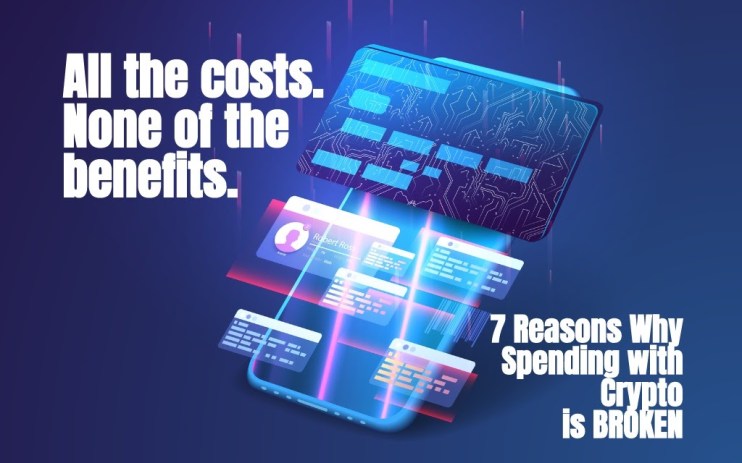7 Reasons why spending with Crypto is broken

Another week, another avalanche of announcements about companies offering payment gateway solutions to merchants so consumers can spend their crypto more easily.
While this makes for decent clickbait headlines, if you peek under the hood even momentarily, you will quickly understand that none of this makes any financial or market sense.
1. Crypto is too slow and illiquid. There must be a fiat buffer.
It does not matter if it is bitcoin or ethereum, ripple or stellar, hex or Tron. Cryptocurrencies suffer from the issues of liquidity and speed. The big coins like bitcoin and ethereum have plenty of liquidity on the majority of exchanges, but smaller coins may have insufficient liquidity to be viable. Even with liquidity, network transaction speeds of both bitcoin and ethereum are far slower than what a merchant requires. You can’t wait for six network confirms when you are standing at the till holding iced chai latte.
To mitigate these issues, companies offering “pay with crypto” services have to maintain a buffer in fiat currency. Transactions are made just like with traditional banking. Using the existing banking infrastructure means that transactions are fast and guaranteed.
2. Crypto transactions cost you and then add merchant fees on top.
Later, the intermediary sells (or at least they try to sell) some of your cryptocurrency. The exchange takes time, and it costs a fee. You, the consumer, get charged the transaction fee for the crypto network, and you most likely pay an exchange rate that is not as good as you could get if you performed the transaction directly on an exchange.
The merchant still has to pay their traditional fee associated with a credit card transaction of around 3%.
So much for crypto getting rid of intermediaries…
3. Crypto is so volatile that a live exchange rate must always be available.
A cup of coffee is £2.20. That is the price in fiat. There is no possibility of showing a consumer the price in bitcoin or any other cryptocurrency because it is continuously fluctuating – and far more than the exchange rate of other fiat currencies.
You never know exactly how much of your crypto that cup of coffee (or those pair of shoes, a new computer or that expensive Lambo you want) is going to cost you, nevermind calculating the ‘worth’ of something. To put it another way, if you’re gonna sell that cup of coffee, how else would you calculate what’s a fair price in crypto without market standard fiat prices to calculate by?
As much as crypto-anarchists desire to change the financial mechanisms of the world, the world still operates in fiat currency – for multiple good reasons.
“As much as the crypto-anarchists want the world to change, the world still operates on fiat currency – for many good reasons.”
4. Refunds are a nightmare.
So you bought a pair of sunglasses for your partner. When you get home, they hate them. So now you have to take them back and get a refund. What happens next is extremely messy.
The merchant takes your credit card and issues a credit for the fiat amount. The refund takes 7-10 days. (Btw, Anyone else besides me tired of the sales clerk’s fake apology that it may take several days for the credit to appear on my statement considering the funds were withdrawn instantly??!)
As promised, 7-10 days later, the funds come back to the payment gateway company. Now they have the fiat back in their account.
Do you think you’re going to get the exact amount of crypto refunded that was taken at the time of sale? No. They will convert the fiat amount into the “current” exchange rate (which is again in their favour) and give you that much crypto back.
Now you have lost out on any positive price action during those 7-10 days to get the crypto back.
5. Tax laws mean that you’ll need to record and report every transaction for capital gains/loss.
In the UK and many other jurisdictions, cryptocurrencies are treated as securities. That means that each time you dispose of an asset, you have to keep a record of the capital gain/loss. Can you imagine doing 45-50 transactions every month and for each transaction, you would have to calculate the basis price for the cryptocurrency to assess capital gain or loss?
That is an awful lot of record-keeping overhead just for the privilege of being able to spend your crypto when you want to.
6. You must transfer your cryptocurrency to a wallet where you don’t hold the keys.
These payment gateway providers usually include wallet services as well. Why would that be? Because they want you to store the crypto in their wallet, where they have the keys. That’s right; they want to be able to move crypto out of your wallet every time there is a transaction.
Like the saying goes: “Not my keys. Not my crypto.”
“Of course, no one really wants to sell. It’s HODL all the way…Right?”
7. Merchants who accept fiat payments that start as crypto may have banking problems in the future. They simply can’t prove the source of funds.
Everyone in crypto knows the challenges of KYC, KYB, AML and CTF compliance. (Know Your Customer, Know Your Business, Anti-Money Laundering, Counter-Terrorism Financing). When a merchant takes money from your credit card or your bank, the bank is responsible for the KYC etc. Will the same be true of these new crypto payment gateway companies? Or will they put themselves in the path of regulatory harm?
You not only need to pass KYC to open an account with one of these “spend your crypto” platforms, but you also have to prove where you got the crypto and how you got the funds to buy the crypto in the first place.
That doesn’t sound pseudonymous at all.
Of course, no one really wants to sell. It’s HODL all the way. Right?
Ask any crypto-evangelist, and they will tell you that whatever token they are holding is going “to the moon”, and that only fools sell. They will point to countless forums and Telegram groups where they discuss fundamentals. (Heads up: Cryptocurrencies have no fundamentals).
They also hype up all of the other reasons why their crypto is such a killer investment. (Heads Up Again: Cryptocurrencies are not an investment, they are gambling – just with worse odds than casinos and, almost always, zero refunds).
Yes, some people want an easier way to spend their crypto. Most people are well aware that using crypto for money is painful at the best of times and that no mainstream merchants will accept crypto. But if everyone is going to HODL to the wall, why would any token holder want an easy way to sell tiny amounts of their ‘killer investment’ stack?
Still very sure spending crypto is a good idea? Let me know in the comments!
Get in touch with us info@blockchainrookies.com / Twitter @igetblockchain

Troy Norcross, Co-Founder Blockchain Rookies
Twitter: @troy_norcross